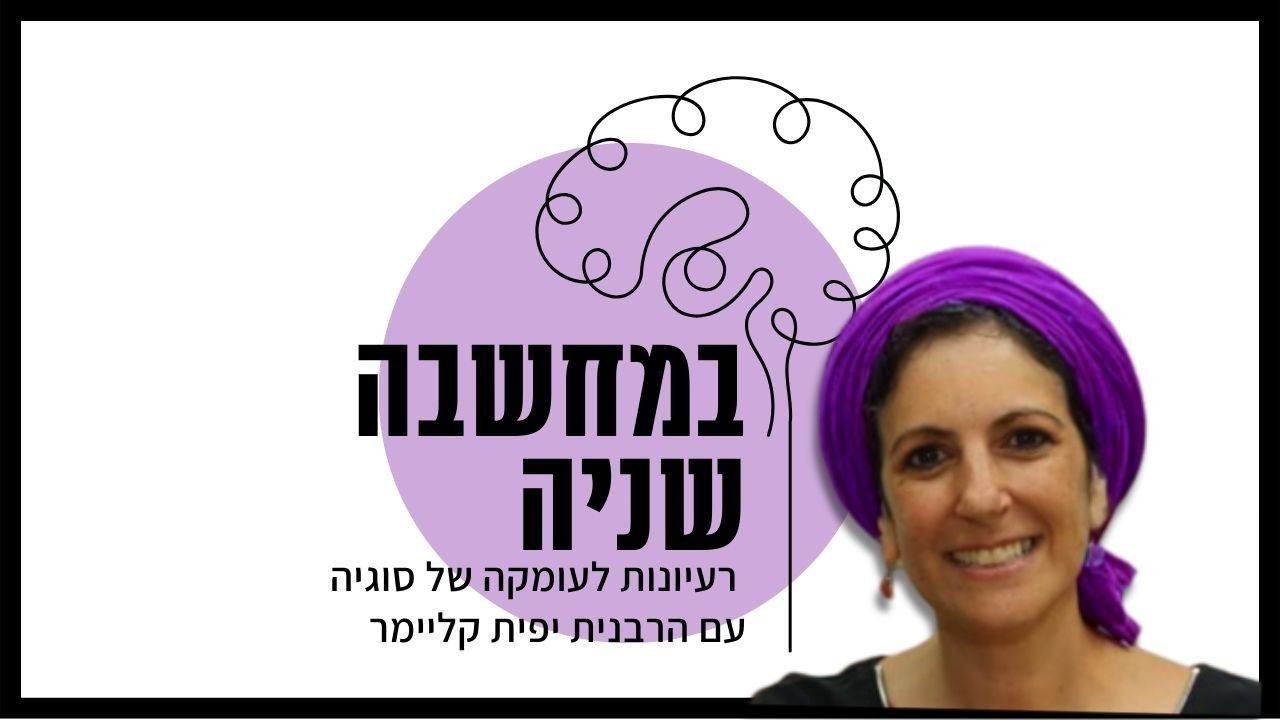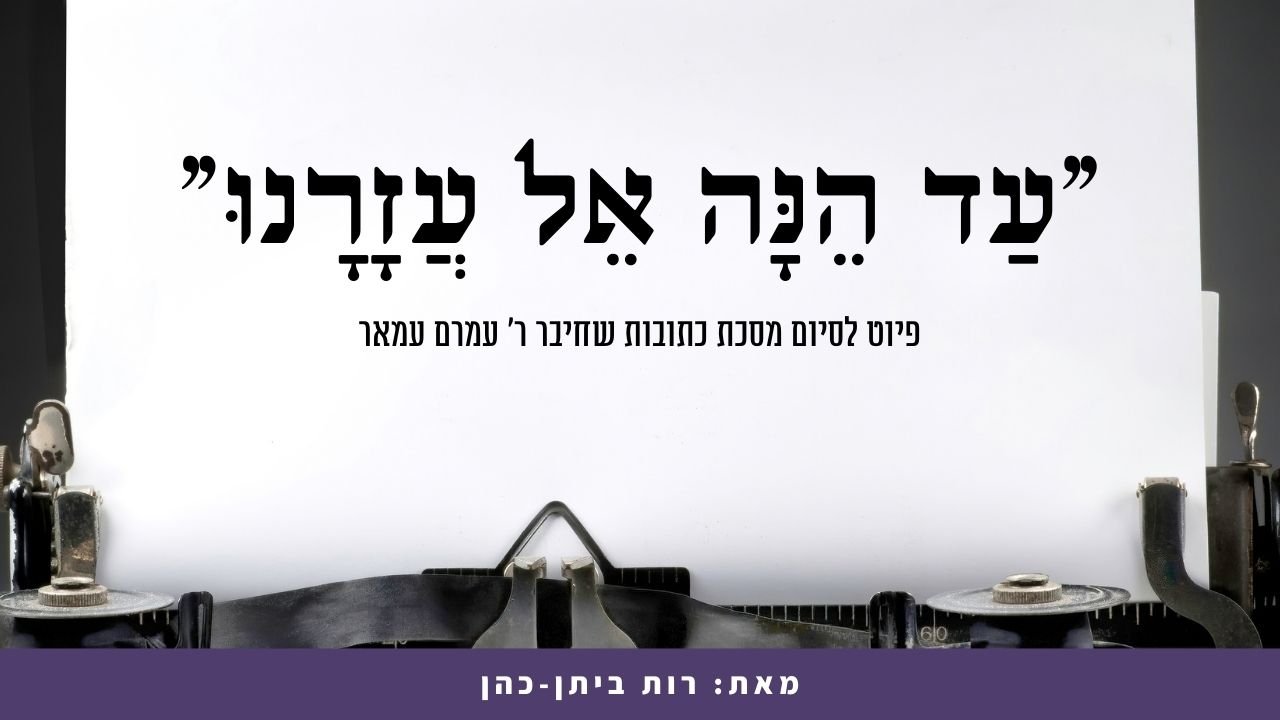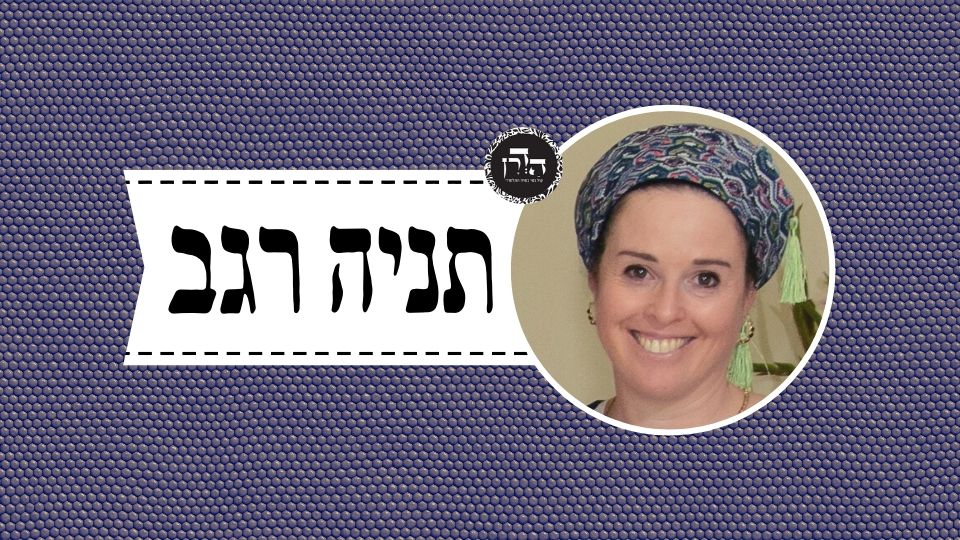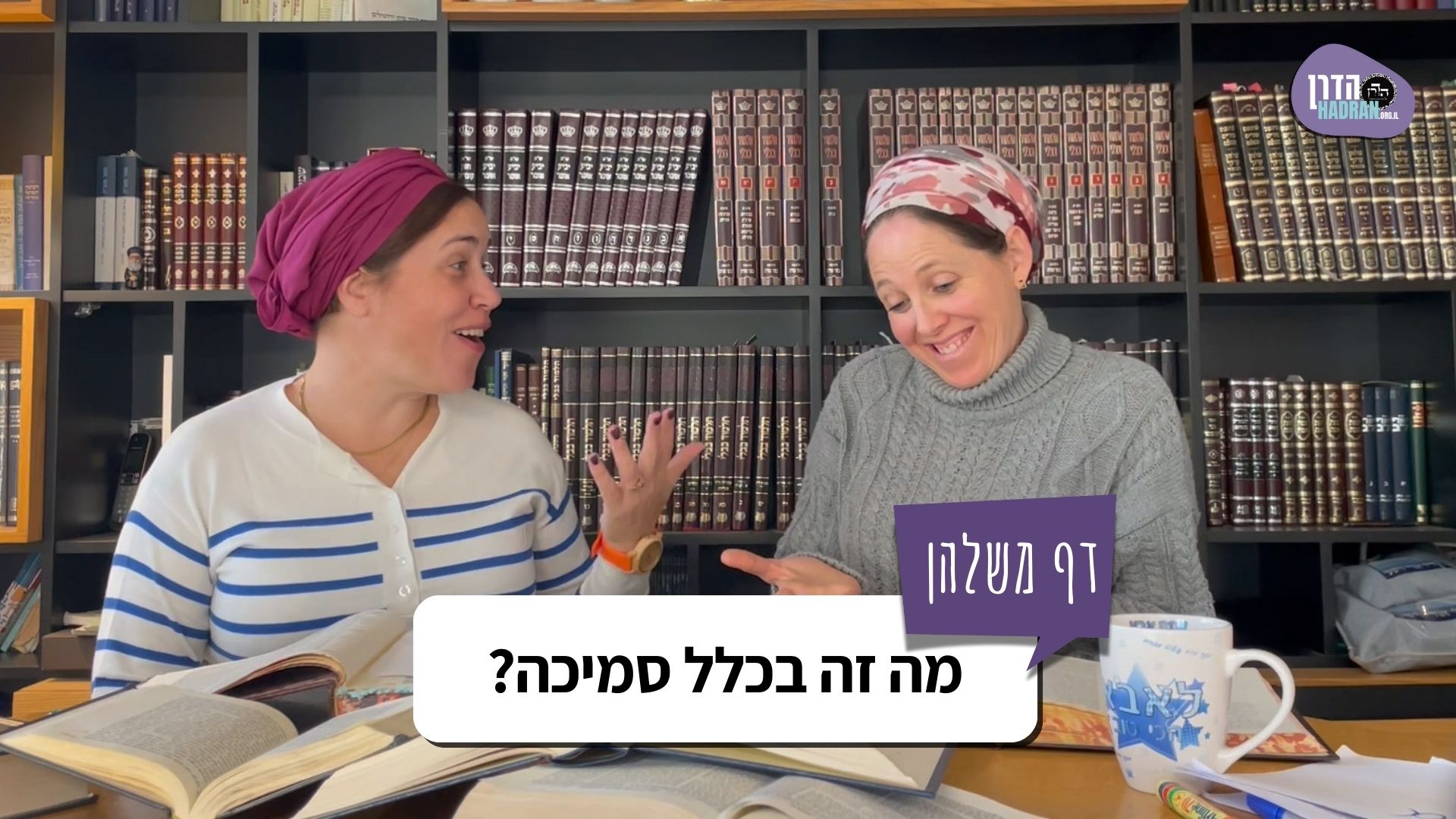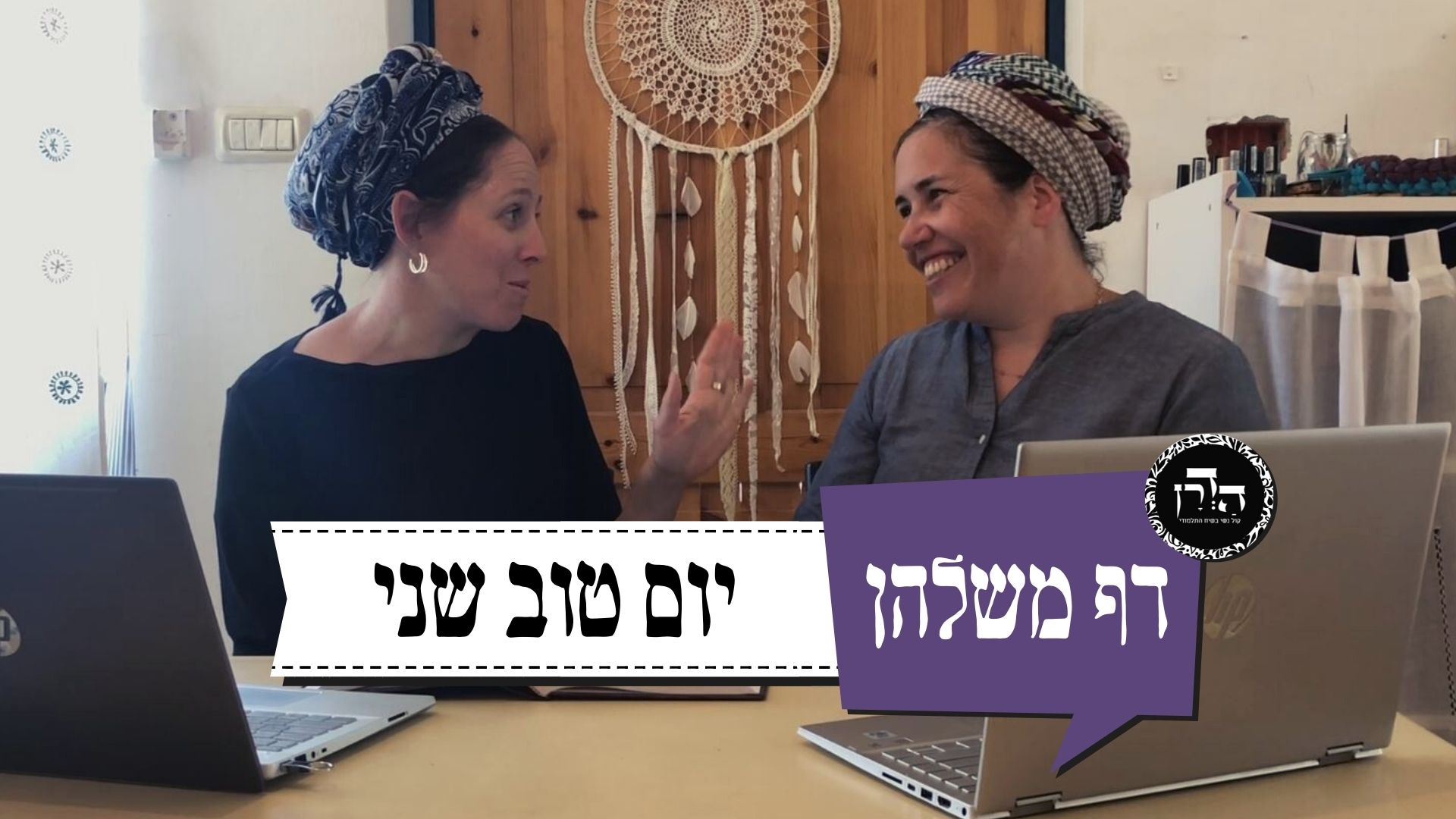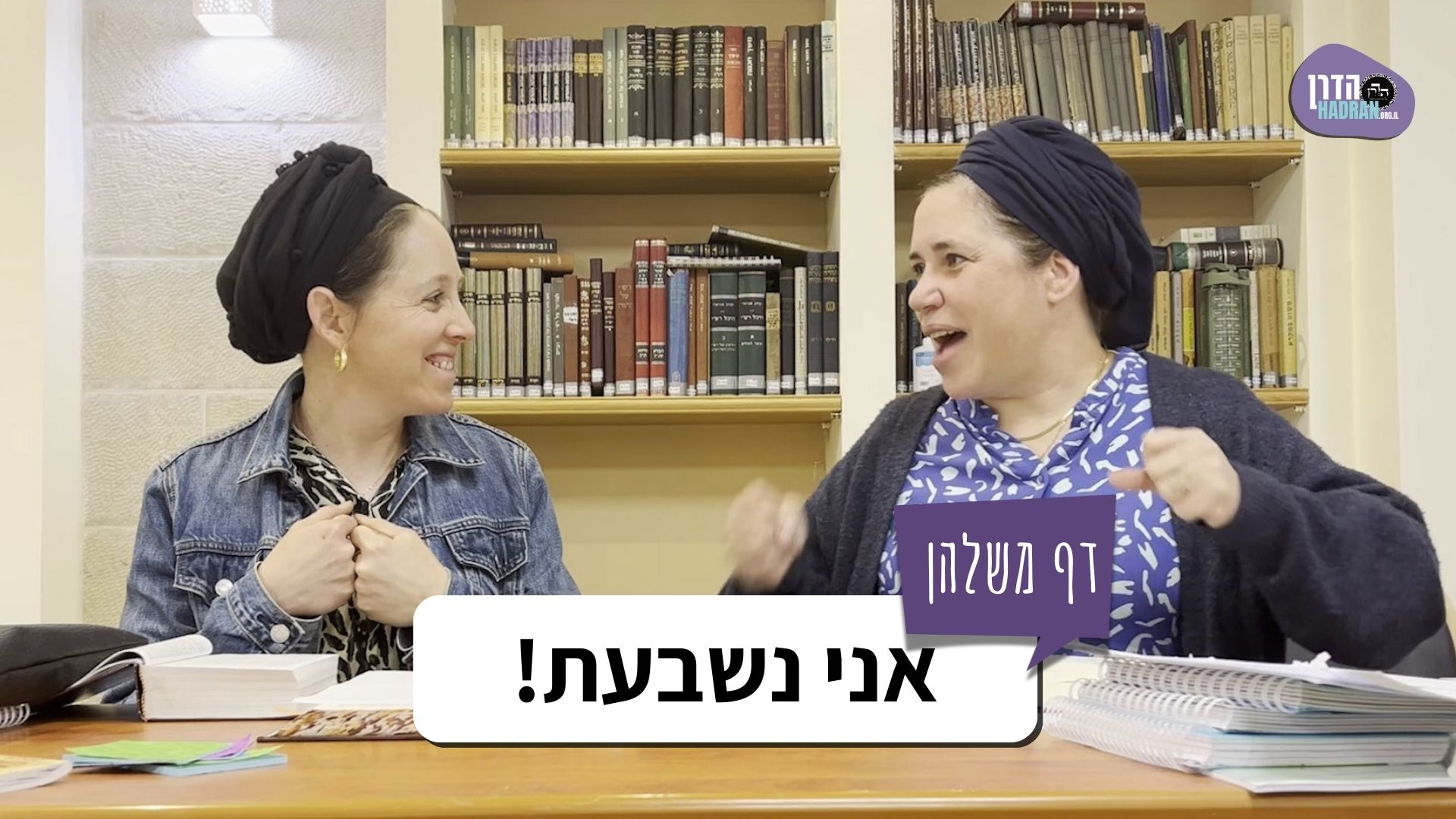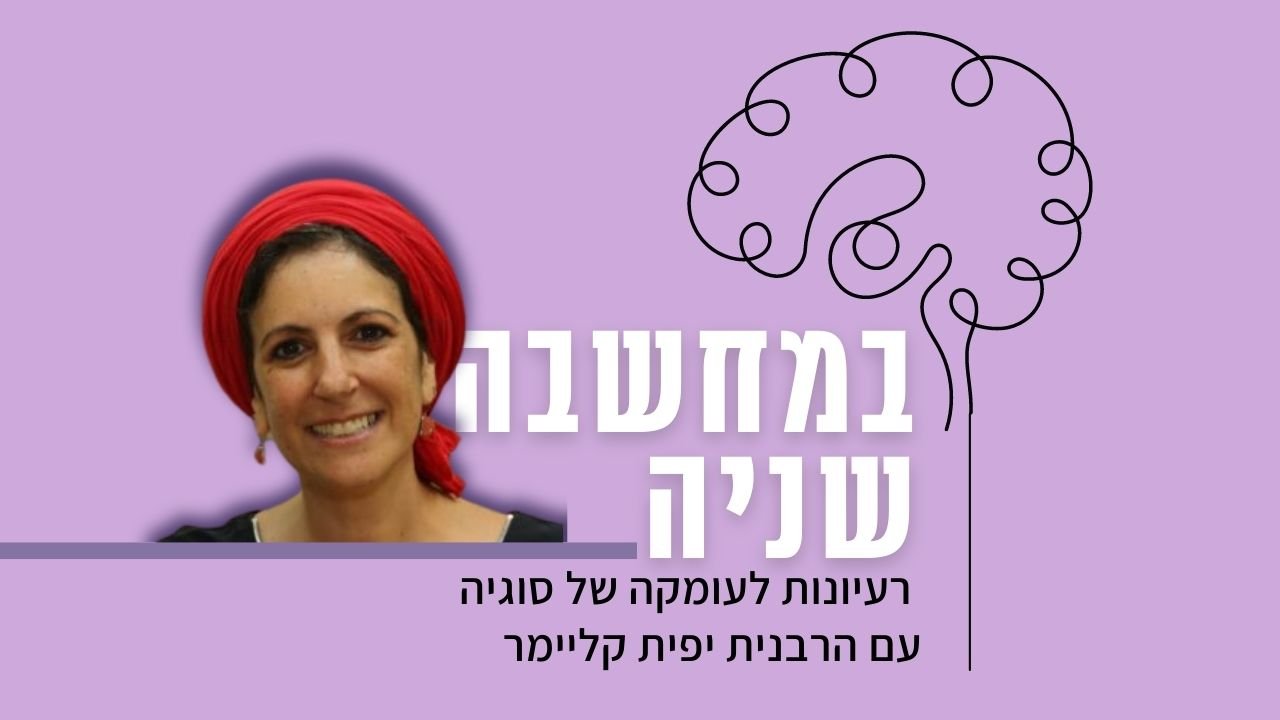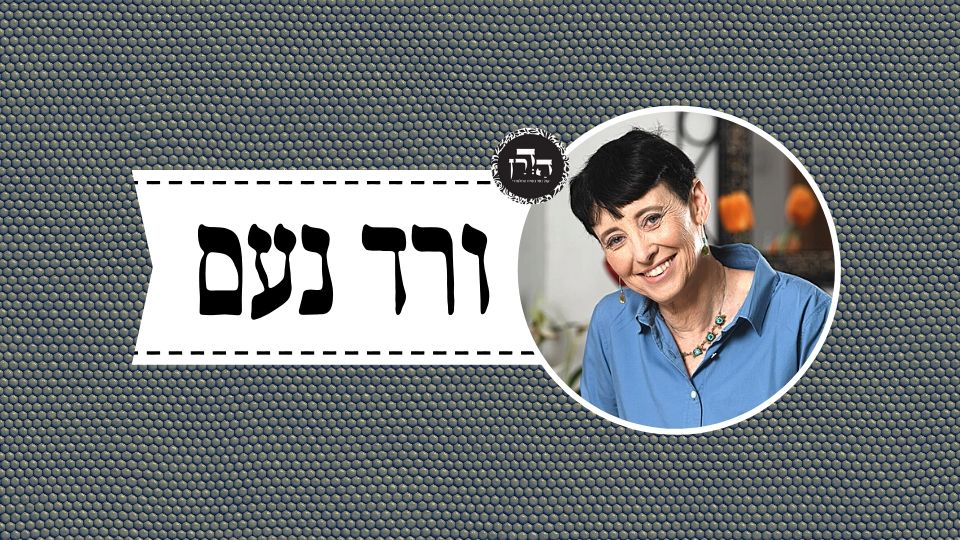האם המחשבה של קטן נחשבת? מעשה שלו? מחשבתו ניכרת מתוך מעשיו? האם רק להחמיר או גם להקל? מה הסטטוס של בשר שנשחט על ידי עובד כוכבים? מין? האם צריך לדאוג לכך ששחטו לשם עבודת כוכבים? מה ההבדל להלכה בין מין לעובד כוכבים?
הלימוד השבוע מוקדש לזכות ולשלום הַיְימׇנוֹט אֱמוּנָה בַּת באנצ’י (קָסָאוּ) בת 11 שנעלמה במקום מגוריה בצפת, לפני שנתיים, ביום ט”ז אדר תשפ”ד (25.2.24), ולא נודעו עקבותיה.
הלימוד השבוע מוקדש למען ביטחון המדינה, החיילים והאזרחים, ולמען חירותו של העם האיראני. שנזכה בקרוב שיתקיים בנו הפסוק: "לַיְּהוּדִים הָיְתָה אוֹרָה וְשִׂמְחָה וְשָׂשֹׂן וִיקָר”.
הלימוד השבוע מוקדש לזכות וְלִשְׁלוֹם הָיימָנוֹט אֱמוּנָה בַּת באנצ’י (קָסָאוּ), בת 11 שנעלמה במקום מגוריה בצפת, לפני שנתיים, ביום ט”ז אדר תשפ״ד (25.2.24), ולא נודעו עקבותיה. אנו מתפללים שֶׁתִּמָּצֵא וְתוּשַׁב לביתה במהרה!
רוצה להקדיש שיעור?

כלים
הלימוד השבוע מוקדש לזכות ולשלום הַיְימׇנוֹט אֱמוּנָה בַּת באנצ’י (קָסָאוּ) בת 11 שנעלמה במקום מגוריה בצפת, לפני שנתיים, ביום ט”ז אדר תשפ”ד (25.2.24), ולא נודעו עקבותיה.
הלימוד השבוע מוקדש למען ביטחון המדינה, החיילים והאזרחים, ולמען חירותו של העם האיראני. שנזכה בקרוב שיתקיים בנו הפסוק: "לַיְּהוּדִים הָיְתָה אוֹרָה וְשִׂמְחָה וְשָׂשֹׂן וִיקָר”.
הלימוד השבוע מוקדש לזכות וְלִשְׁלוֹם הָיימָנוֹט אֱמוּנָה בַּת באנצ’י (קָסָאוּ), בת 11 שנעלמה במקום מגוריה בצפת, לפני שנתיים, ביום ט”ז אדר תשפ״ד (25.2.24), ולא נודעו עקבותיה. אנו מתפללים שֶׁתִּמָּצֵא וְתוּשַׁב לביתה במהרה!
כלים
העמקה
רוצה להבין מה באמת קורה מתחת לפני השטח של הסוגיה?
שיעורים, פודקאסטים והרחבות של מיטב המורות שלנו יפתחו לך עוד זוויות וכיווני חשיבה.
חדשה בלימוד הגמרא?
זה הדף הראשון שלך? איזו התרגשות עצומה! יש לנו בדיוק את התכנים והכלים שיעזרו לך לעשות את הצעדים הראשונים ללמידה בקצב וברמה שלך, כך תוכלי להרגיש בנוח גם בתוך הסוגיות המורכבות ומאתגרות.
פסיפס הלומדות שלנו
גלי את קהילת הלומדות שלנו, מגוון נשים, רקעים וסיפורים. כולן חלק מתנועה ומסע מרגש ועוצמתי.
חולין יג
ואין להן מחשבה
but they do not have the capacity to effect a halakhic status by means of thought.
אמר ליה מחשבה גרידתא לא קא מיבעיא ליה כי קא מיבעיא ליה מחשבתו ניכרת מתוך מעשיו
Rabbi Ḥiyya bar Abba said to Rabbi Ami: With regard to a case of effecting a halakhic status by means of thought alone, Rabbi Yoḥanan does not raise a dilemma. When he raises a dilemma, it is with regard to a case where his thought is discernible from his actions.
כגון דהוה קיימא עולה בדרום ואתיוה בצפון ושחטה מאי מדאתייא בצפון ושחט איכוין לה או דילמא מקום הוא דלא איתרמי ליה
For example, in a case where an animal that is brought as a burnt offering was standing in the south of the Temple courtyard and a minor took it to the north of the courtyard, the designated place for its slaughter, and slaughtered it there, what is the halakha? Can one conclude from the fact that he took it to the north and slaughtered it there that he had the intent to slaughter the animal for the sake of a burnt offering; or perhaps he moved the animal to the north because a place did not happen to be available for him in the south?
הא נמי אמרה רבי יוחנן חדא זימנא דתנן המעלה פירותיו לגג מפני הכנימה וירד עליהם טל אינן בכי יותן ואם נתכוין לכך הרי הן בכי יותן
Rabbi Ami asked: But with regard to this matter, too, Rabbi Yoḥanan already said a conclusive resolution one time, as we learned in a mishna (Makhshirin 6:1): In the case of one who takes his produce up to the roof to protect it from insects, and dew fell upon it, the produce is not in the category of the verse: “But when water is placed upon the seed” (Leviticus 11:38), from which it is derived that produce becomes susceptible to ritual impurity only if it is dampened by one of seven liquids and its owner was agreeable to its dampening. And if after taking the produce up to the roof he intended that the produce would be dampened by dew, the produce is in the category of the verse “But when water is placed upon the seed.”
העלום חרש שוטה וקטן אף על פי שנתכוונו לכך אינן בכי יותן מפני שיש להן מעשה ואין להן מחשבה
That mishna continues: In a case where a deaf-mute, an imbecile, or a minor took the produce up to the roof, even if they intended that the produce would be dampened by dew, the produce is not in the category of the verse “But when water is placed upon the seed” due to the fact that they have the capacity to perform an action but they do not have the capacity for halakhically effective thought.
וא”ר יוחנן ל”ש אלא שלא היפך בהן אבל היפך בהן הרי זה בכי יותן
And Rabbi Yoḥanan says: The tanna taught this halakha only in a case where the minor did not turn them over. But if he turned them over, indicating that he wants them to be dampened by the dew, the produce is in the category of the verse “But when water is placed upon the seed.” Evidently, Rabbi Yoḥanan rules that when the intention of a minor is apparent from his actions, it is halakhically effective.
הכי קא מיבעיא ליה דאורייתא או דרבנן
Rabbi Ḥiyya bar Abba said to Rabbi Ami that this is the dilemma that Rabbi Yoḥanan raises: In a case where the intent of a minor is clear from his actions, is the fact that his thought is effective by Torah law or by rabbinic law? That is one version of the exchange between Rabbi Ḥiyya bar Abba and Rabbi Ami.
רב נחמן בר יצחק מתני הכי א”ר חייא בר אבא בעי רבי יוחנן קטן יש לו מעשה או אין לו מעשה
Rav Naḥman bar Yitzḥak teaches their exchange in this manner. Rabbi Ḥiyya bar Abba says that Rabbi Yoḥanan raises a dilemma: With regard to a minor, does he have the capacity to perform an action that is halakhically effective or does he not have the capacity to perform such an action?
אמר ליה רבי אמי ותיבעי ליה מחשבה מאי שנא מחשבה דלא קא מיבעיא ליה דתנן אין להן מחשבה מעשה נמי לא תיבעי ליה דתנן יש להן מעשה
Rabbi Ami said to Rabbi Ḥiyya bar Abba: And let Rabbi Yoḥanan raise this dilemma with regard to the thought of a minor. What is different about the thought of a minor that Rabbi Yoḥanan does not raise a dilemma? Is it due to the fact that we learned in a mishna (Kelim 17:15): A deaf-mute, an imbecile, and a minor do not have the capacity for effective thought? With regard to action as well let him not raise this dilemma, as we learned in the same mishna: They have the capacity to perform an action.
הכי קא מיבעיא ליה דאורייתא או דרבנן ופשיט יש להן מעשה ואפילו מדאורייתא אין להן מחשבה ואפי’ מדרבנן מחשבתו ניכרת מתוך מעשיו מדאורייתא אין לו מדרבנן יש לו
Rabbi Ḥiyya bar Abba said to Rabbi Ami that this is the dilemma that Rabbi Yoḥanan raises: Is the fact that their actions are effective and their thought is ineffective by Torah law, and a minor’s action would consequently be effective even with regard to the sacrifice of a burnt offering, or is this fact by rabbinic law and it is merely a stringency? And Rabbi Yoḥanan resolves the dilemma: They have the capacity to perform an action and it is effective, even by Torah law. But they do not have the capacity for effective thought, even by rabbinic law. Nevertheless, in a case where his thought is apparent from his actions, by Torah law he does not have effective thought, and by rabbinic law he has effective thought.
בעא מיניה שמואל מרב הונא מנין למתעסק בקדשים שהוא פסול שנאמר (ויקרא א, ה) ושחט את בן הבקר שתהא שחיטה לשם בן בקר אמר לו זו בידינו היא לעכב מנין (ת”ל) (ויקרא יט, ה) לרצונכם תזבחוהו לדעתכם זבוחו:
§ Shmuel asked Rav Huna: From where is it derived with regard to one who acts unawares in the slaughter of sacrificial animals, i.e., he slaughtered without intending to perform the act of slaughter at all, that the offering is disqualified? Rav Huna said to him that it is derived from a verse, as it is stated: “And he shall slaughter the young bull” (Leviticus 1:5), indicating that the slaughter must be for the sake of a young bull, i.e., knowing that he is performing an act of slaughter. Shmuel said to him: we received this as an established halakha already that one must have intent to slaughter the animal ab initio. But from where is it derived that intent to slaughter is indispensable even after the fact? It is derived from a verse, as the verse states: “You shall slaughter it to your will” (Leviticus 19:5), indicating: Slaughter the animal with your intent, i.e., in the form of a purposeful action.
מתני׳ שחיטת עובד כוכבים נבלה ומטמאה במשא:
MISHNA: Slaughter performed by a gentile renders the animal an unslaughtered carcass, and the carcass imparts ritual impurity through carrying.
גמ׳ נבלה אין איסור הנאה לא מאן תנא א”ר חייא ברבי אבא א”ר יוחנן דלא כרבי אליעזר דאי ר”א האמר סתם מחשבת עובד כוכבים לעבודת כוכבים
GEMARA: The slaughter renders the animal an unslaughtered carcass, yes; an item from which deriving benefit is prohibited, no. Who is the tanna who taught the mishna? Rabbi Ḥiyya, son of Rabbi Abba, said that Rabbi Yoḥanan said: It is not in accordance with the opinion of Rabbi Eliezer, as, if it were in accordance with the opinion of Rabbi Eliezer, doesn’t he say: The unspecified thought of a gentile is for idol worship.
רבי אמי אמר הכי קתני שחיטת עובד כוכבים נבלה הא דמין לעבודת כוכבים תנינא להא דת”ר שחיטת מין לעבודת כוכבים פיתו פת כותי יינו יין נסך ספריו ספרי קוסמין פירותיו טבלין וי”א אף
Rabbi Ami said that this is what the mishna is teaching: Slaughter performed by a gentile renders the animal an unslaughtered carcass, but slaughter performed by a heretic is for the sake of idol worship. The Gemara notes: We learn from an inference in the mishna that which the Sages taught explictly in a baraita: Slaughter performed by a heretic is for the sake of idol worship and deriving benefit from it is prohibited, the halakhic status of his bread is that of the bread of a Samaritan, the status of his wine is that of wine used for a libation in idol worship, his sacred scrolls that he writes are the scrolls of sorcerers and it is a mitzva to burn them, his produce is untithed produce even if he separated teruma and tithes, and some say: Even
בניו ממזרין
his sons are mamzerim, as he is indifferent to his wife’s engaging in adultery.
ות”ק אשתו לא מפקר
The Gemara asks: And the first tanna, why did he not include the ruling that the sons of a heretic are mamzerim? The Gemara answers: In his opinion, a heretic does not release his wife and allow her to engage in adultery.
אמר מר שחיטת עובד כוכבים נבלה וניחוש שמא מין הוא אמר רב נחמן אמר רבה בר אבוה אין מינין באומות עובדי כוכבים
The Master said in the mishna: Slaughter performed by a gentile renders the animal an unslaughtered carcass. The Gemara challenges this: And let us be concerned that perhaps he is a heretic who is a devout idolater and deriving benefit from his slaughter is prohibited. Rav Naḥman said that Rabba bar Avuh says: There are no such heretics among the nations of the world.
והא קאחזינן דאיכא אימא אין רוב עובדי כוכבים מינין סבר לה כי הא דאמר ר’ חייא בר אבא א”ר יוחנן נכרים שבחוצה לארץ לאו עובדי עבודת כוכבים הן אלא מנהג אבותיהן בידיהן
The Gemara asks: But don’t we see that there are? The Gemara answers: Say the majority of the people of the nations of the world are not heretics, and with regard to slaughter one follows the majority. The Gemara notes: Rabba bar Avuh holds in accordance with that which Rabbi Ḥiyya bar Abba says that Rabbi Yoḥanan says: The status of gentiles outside of Eretz Yisrael is not that of idol worshippers, as their worship is not motivated by faith and devotion. Rather, it is a traditional custom of their ancestors that was transmitted to them.
אמר רב יוסף בר מניומי אמר רב נחמן אין מינין באומות עובדי כוכבים למאי אילימא לשחיטה השתא שחיטת מין דישראל אמרת אסירא דעובד כוכבים מבעיא אלא למורידין השתא דישראל מורידין דעובדי כוכבים מבעיא
Rav Yosef bar Minyumi says that Rav Naḥman says: There are no heretics among the nations of the world, i.e., gentile heretics do not have the halakhic status of actual heretics. The Gemara asks: With regard to what matter did Rav Naḥman state the halakha? If we say that it is with regard to slaughter, now that you said the slaughter of a Jewish heretic is forbidden, is it necessary to say the slaughter of a gentile heretic is forbidden? Rather, it is with regard to the halakha that one lowers them into a pit, i.e., one may kill a heretic, and Rav Naḥman holds that one may not kill them. But this too is difficult, as now if one lowers a Jewish heretic into a pit, is it necessary to say that one lowers a gentile heretic?
אמר רב עוקבא בר חמא לקבל מהן קרבן דתניא (ויקרא א, ב) מכם ולא כולכם להוציא את המומר מכם בכם חלקתי ולא בעובדי כוכבים
Rav Ukva bar Ḥama said: It is stated with regard to accepting an offering from them, as it is taught in a baraita with regard to the verse: “When any person of you shall bring an offering” (Leviticus 1:2): The verse states: “Of you,” and not: Of all of you, to exclude the Jewish transgressor who regularly violates a prohibition. Furthermore, God states: “Of you,” to mean that among you, the Jews, I distinguished between a transgressor and other Jews, but not among the nations. One accepts an offering from all gentiles, even a heretic.
ממאי דלמא הכי קאמר מישראל מצדיקי קבל מרשיעי לא תקבל אבל בעובדי כוכבים כלל כלל לא לא ס”ד דתניא איש מה ת”ל איש איש לרבות העובדי כוכבים שנודרים נדרים ונדבות כישראל:
The Gemara asks: From where do you draw that conclusion? Perhaps this is what the verse is saying: With regard to offerings from Jews, from righteous Jews accept the offering and from wicked Jews do not accept the offering; but with regard to the nations of the world, do not accept their offerings at all. The Gemara rejects that possibility: That should not enter your mind, as it is taught in a baraita with regard to the verse: “Any man [ish ish] from the house of Israel…who shall sacrifice his offering” (Leviticus 22:18): Since it would have been sufficient to write: A man [ish], what is the meaning when the verse states: “Any man [ish ish]”? It serves to include the gentiles, who may vow to bring vow offerings and gift offerings like a Jew.
ומטמאה במשא: פשיטא כיון דנבלה היא מטמאה במשא אמר רבא הכי קתני זו מטמאה במשא ויש לך אחרת שהיא מטמאה אפילו באהל ואיזו זו תקרובת עבודת כוכבים וכרבי יהודה בן בתירא
§ The mishna states with regard to an animal slaughtered by a gentile: And the carcass imparts ritual impurity through carrying. The Gemara asks: Isn’t it obvious? Since it is considered an unslaughtered carcass it imparts ritual impurity through carrying. Rava said that this is what the tanna is teaching: This slaughtered animal imparts ritual impurity through carrying, and you have another animal that imparts impurity even in a tent, i.e., if one is beneath the same roof with this animal he becomes impure even though he neither touched it nor carried it. And which animal is that? That animal is an idolatrous offering, and this statement is in accordance with the opinion of Rabbi Yehuda ben Beteira cited below.
איכא דאמרי אמר רבא הכי קתני זו מטמאה במשא ויש לך אחרת שהיא כזו שמטמאה במשא ואינה מטמאה באהל ואיזו זו תקרובת עבודת כוכבים ודלא כר’ יהודה בן בתירא
There are those who say an alternative version of Rava’s statement: Rava said that this is what the tanna is teaching: This slaughtered animal imparts ritual impurity through carrying, and you have another animal that is like this one in that it imparts ritual impurity through carrying and does not impart impurity in a tent. And which animal is this? This animal is an idolatrous offering, and this statement is not in accordance with the opinion of Rabbi Yehuda ben Beteira.
דתניא ר’ יהודה בן בתירא אומר מנין לתקרובת עבודת כוכבים שהיא מטמאה באהל שנאמר (תהלים קו, כח) ויצמדו לבעל פעור ויאכלו זבחי מתים מה מת מטמא באהל אף תקרובת עבוד’ כוכבי’ מטמאה באהל:
As it is taught in a baraita that Rabbi Yehuda ben Beteira says: From where is it derived with regard to an idolatrous offering that it imparts impurity in a tent? It is derived from a verse, as it is stated: “They adhered to Ba’al-Peor and ate the offerings to the dead” (Psalms 106:28). Just as a corpse imparts impurity in a tent, so too an idolatrous offering imparts impurity in a tent.
מתני׳ השוחט בלילה וכן הסומא ששחט שחיטתו כשרה:
MISHNA: In the case of one who slaughters an animal at night, and likewise in the case of the blind person who slaughters an animal, his slaughter is valid.
גמ׳ השוחט דיעבד אין לכתחלה לא ורמינהי לעולם שוחטין בין ביום ובין בלילה בין בראש הגג בין בראש הספינה
GEMARA: The Gemara infers from the formulation of the mishna: One who slaughters, and not: One may slaughter, that with regard to the slaughter of one who slaughters at night, after the fact, yes, it is valid, but ab initio, one may not do so. The Gemara raises a contradiction from a baraita (Tosefta 1:4): One may always slaughter, both during the day and at night, both on the rooftop and atop a ship, indicating that slaughter at night is permitted ab initio.
אר”פ בשאבוקה כנגדו אמר רב אשי דיקא נמי דקתני התם דומיא דיום והכא דומיא דסומא ש”מ:
Rav Pappa said: The tanna of the baraita is referring to a case where there is a torch opposite the slaughterer; therefore, it is permitted ab initio. Rav Ashi said: The language of the baraita is also precise, as slaughter at night is taught there in the baraita similar to slaughter during the day, based on the juxtaposition: Both during the day and at night. And here slaughter at night is taught similar to the slaughter performed by a blind person, with no light, based on the juxtaposition: One who slaughters at night, and likewise the blind person who slaughters. Therefore, the slaughter is valid only after the fact. The Gemara concludes: Learn from it.

